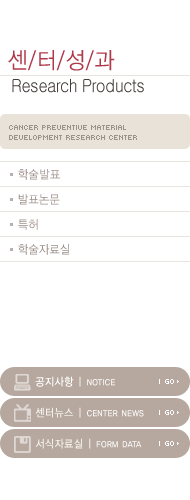 |
 |
 |
 |
|
 |
|
|
| In vivo Anti-Cancer Activity of Korean Angelica Gigas and its Major Pyranocoumarin Decursin |

 |
|
|
글쓴이 : 최고관리자
날짜 : 09-03-09 15:24
조회 : 1973
 |
|
Lee HJ, Lee HJ, Lee EO, Lee JH, Lee KS, Kim KH, Kim SH, Lu J.
We have reported that a 10-herbal traditional formula containing Korean Angelica gigas Nakai (AGN) exerts potent anti-cancer efficacy and identified decursin and decursinol angelate (DA) from AGN as novel anti-androgens. Here, we determined whether AGN would exert in vivo anti-cancer activity and whether decursin or DA could account for its efficacy. The AGN ethanol extract was tested against the growth of mouse Lewis lung cancer (LLC) allograft in syngenic mice or human PC-3 and DU145 prostate cancer xenograft in immunodeficient mice. The pharmacokinetics of decursin and DA were determined. The AGN extract significantly inhibited LLC allograft growth (30 mg/kg) and PC-3 and DU145 xenograft growth (100 mg/kg) without affecting the body weight of the host mice. Biomarker analyses revealed decreased cell proliferation (Ki67, PCNA), decreased angiogenesis (VEGF, microvessel density) and increased apoptosis (TUNEL, cPARP) in treated tumors. Decursin and DA injected intraperitoneally were rapidly hydrolyzed to decursinol. Decursinol and decursin at 50 mg/kg inhibited LLC allograft growth to the same extent, comparable to 30 mg AGN/kg. Therefore the AGN extract possessed significant in vivo anti-cancer activity, but decursin and DA only contributed moderately to that activity, most likely through decursinol.
|
|
|
|
|
|
